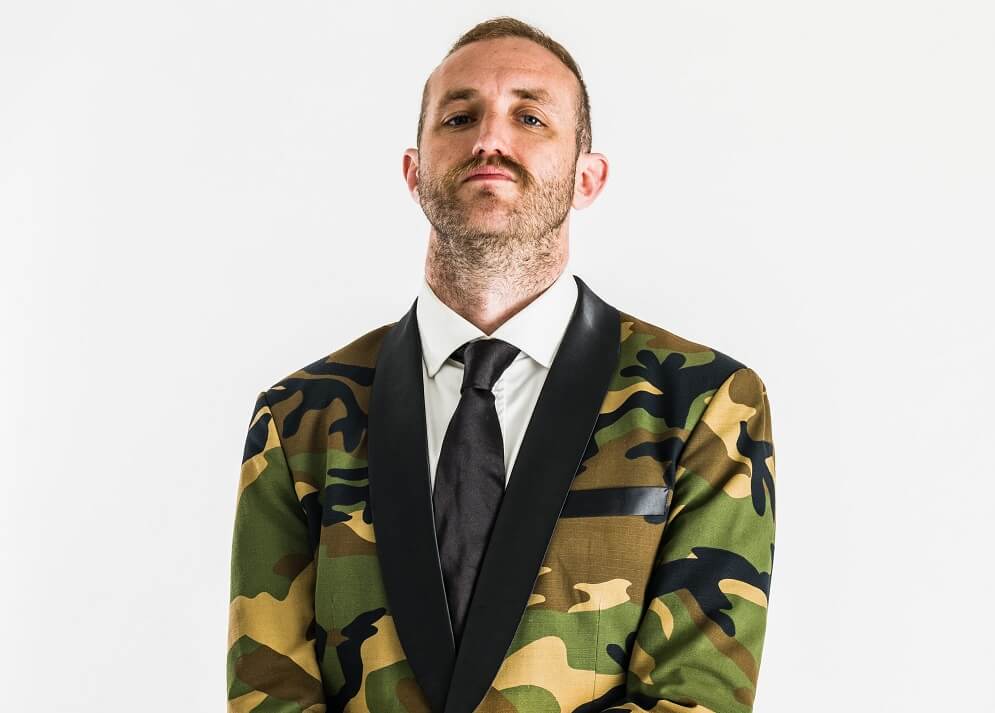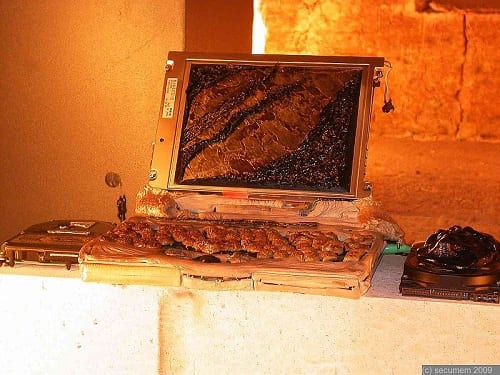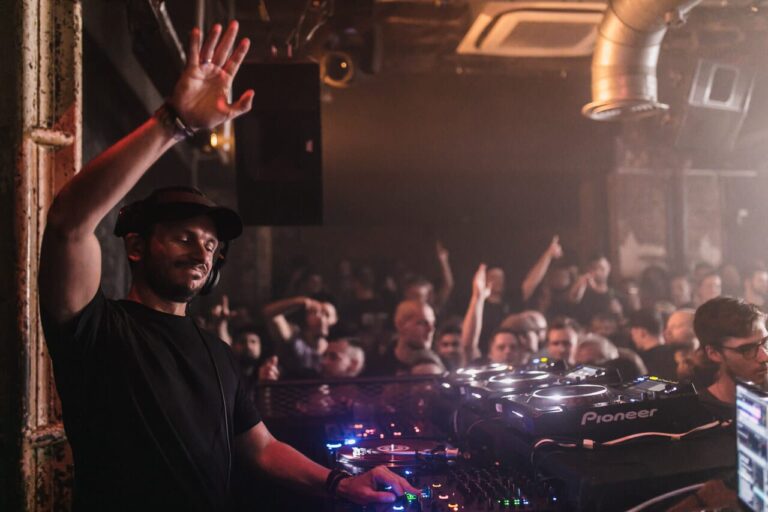You probably know High Rankin. You might have danced with him 352 days straight to Kenny Ken at Raveageddon, you might have seen him sing Doctor P’s Sweet Shop on X Factor or heard him talk about adult toys with David Guetta.
You’ve definitely enjoyed his music. At his peak as a producer he absolutely stank of skank, cooking up full fat late-2000s flavoured stampers like this…
Much more recently you may well have enjoyed one of his famous Rankin Records sessions where he regales you with bangers of yore from a stately Winchester armchair. Maybe you’ve rallied with him in his in recent plight to save the lives of jump up producers or perhaps just sat down and savoured the sweet stench of Coffee & Memes, his lobster friendly daily show on his own radio station he’s developed and launched; Threshold.fm
Whichever way Rankin has trespassed into your life, whimsically fly tipping wit upside your features, you tend not to forget it. A rarity in a scene that takes itself far too seriously, he’s consistently and successfully weaved humour into his craft.
But, as is far too often the case in the creative industry, it hasn’t always been easy. In fact behind the skits and gabba records, for the last four years Rankin has battled some nasty black dogs. He’s suffered acute depression and anxiety about his creative abilities and achievements and, for a long time, was actively plotting his exit strategy from the music industry.
Thankfully he found a better path. Through a variety of major lifestyle changes and new projects, he’s found his own solutions and now reckons he hasn’t felt as fulfilled as he is now about his work in many years. How did he achieve it? By finding meaning in his work again and creating a sense of community… Something he severely missed when chastising himself in a windowless studio for hours on end every day.
Next week sees him bringing this newfound meaningfulness and community to Hoxton Square Bar & Kitchen for a series of three MENtal Health live podcasts as part of the venue’s Super Culture series. The shows will see him be joined by the likes of Cyantific, Tim Exile, Ben Verse and many more as they untangle the thorny issues of mental health in the music industry and spread the message that’s getting louder over recent years; you’re not alone, we can help each other, let’s work together and be nicer and more considerate to each other.
With this in mind we cancelled our lazer quest session with Andy C and took the time to talk to Mr Rankin and find out how he has completely flipped his life around in the last year. Grab a coffee, maybe a few memes if you’re that way inclined, this one runs deep…
Can we start with your own personal experiences?
That’s probably the best place. I guess, over the last maybe four or so years, I’ve had serious ups and downs and kinda falling in and out of… Well. I don’t what, really.
Is this personally or musically?
The two are intrinsically linked. I kept finding I had plateaued. I was no longer happy with my output or my position with the scene or industry. I was very unhappy with my creative and working life which caused downward spirals that affected all aspects of my life. If you’re self-employed, when you’re suffering depression and you can’t get out of bed in the morning, there’s no HR department to help you. There’s no sick pay. You can’t take a mental health day. You can’t take a holiday off.
Self-employment in any creative industry is hard and unforgiving. You’re only as good as your last gig…
Exactly. And over the course of the last four years what I’d basically do is shirk any responsibility for what was going on. I’d be like ‘the problem is the space, I’ll move studio’. Or move house, or move studio again. I’d find endless amounts of stuff to get in the way. Anything to avoid taking responsibility really. It got to the stage last year when I’d moved to London, got another studio and set it up. But things still weren’t right. So I decided I needed more space and got another room in the same building and that didn’t feel right. After that point I felt I had absolutely nowhere to run. I burnt out savagely.
So around this time Rankins Records was picking up. But behind all of that you weren’t in a good place?
There were a couple of months where I had truly created my own personal hell. Stuff was not good at all. Luckily at the time I was listening to a lot of podcasts, audio books, watching lectures online and videos about all sorts of things and that, combined with support from my girlfriend and friends, I was able to start picking apart the problem and began to find some answers.
I realised I need to take things out of my life that were making me feel this way. I somehow took a step back from everything and looked at what was causing my depression and ask ‘why is this happening?’ After that it made total sense. If you spend 90 percent of your waking life, for years on end, on your own, in a room with no windows, trying to compete in a game that no one is quite sure of the rules of while looking at social media where everyone posts a highlight reel of their career and you compare that to how terrible you feel the collapse is just a matter of time.
What was the most significant lifestyle change you made then?
I sat down and said ‘okay I need to get out of the music industry or something really needs to rejig.’ I wrote a list of what goes on in the week and note the things that make me happy and the things that don’t. I have to say I’m also very lucky to be living with my girlfriend and have her support doing this. I’m not sure I’d have had the clarity to make those lists without that.
What made you happy then?
Literally the only thing was Rankin’s Records. That was the only thing that I really enjoyed each week. And it was because I was going back to my original musical passion and reason for getting into it all in the first place. It was also live with hundreds with viewers all getting involved and very engaged in the chat and the feedback was really positive. It was building a community within itself. For that hour I wasn’t alone and the penny dropped. I’d read a lot of articles about ‘having a conversation about mental health in the dance community’ and I thought ‘what is this community?’ Do we all go to lunch together? Do we go to church or use the same sport centre? Where’s the youth club? It doesn’t exist. It’s a load of people working on their own in windowless rooms driving themselves crazy.
I think there are these little slithers of community at certain events perhaps, but yeah, day to day, the tangible sense of a community isn’t tangible…
Yeah. And those moments are few and far between. And even then from a DJ’s perspective, you’re not actually engaging in that community when you perform. You’re leading it.
Or if you’re travelling to another gig/have to shoot off
Or decide to wait in your hotel room until 2am and get picked up five minutes before your set like most DJs do. And you can only do that raving community thing for a certain amount of time. No one wants to be that 50-year-old on pingers sweating away at the front do they?
No sirree!
So where else can a community be formed? Because community is super important to humans as a whole. People suffer tremendous damage from loneliness. It makes people ill. So for DJs, people who tend to enjoy performing and being outgoing, spending all your time on your own in the studio is at odds with your natural habitat. I also think that to be involved in making music and learning production you have to be a little weird. So the people it most appeals to are the most likely for it to fuck over.
That’s why there’s a higher amount of people suffering mental health in music
Yeah. There are so many different strands to it. Like when you first start making music and you get into it, the amount you learn in the first year is the biggest development you make. But over time that development slows to little footsteps, you’re no longer learning at the rate you once were. And when you were originally learning that was what you were getting fulfilment from. You’re developing a new skill and it gives what you’re doing an incredible amount of meaning. But over time the curtain has been pulled back, you see how the magician does his tricks and the magic is somewhat lost. So when you feel you’re not learning you get locked into very rigid patterns of behaviour and work. So you lose that meaning and fulfilment.
When you’re learning you’re working the brain like a muscle. You don’t need to be learning about production, it could be another creative pursuit and it all feeds into your well-being. You need to constantly be creating the new neural pathways and push yourself or you just atrophy.
So this is why you’ve set up your own entire radio station
Yeah. The idea was that if I enjoy doing the radio show then how can I do that all the time? What if I did a show every day? How would that help? It helped immeasurably in various ways. Firstly it gave me a structure; I hadn’t had to get out of bed in the morning for 10 years or more since I’ve been self-employed. But when I do my show at 10am I have to be in at 8.30 to make sure it’s all prepared and I have to be out of bed at 7. The first half of my day is planned out and there’s no room for error. That structure is tremendously positive.
And also, potentially over time, the radio station could solve the community aspect I was lacking. I want to develop the station as a hub for interesting people to come and contribute and do cool and interesting shows. I’d like to have helpful shows, whether it’s mental health, men’s issues, women’s issues, diet, nutrition, philosophy, art, culture. With all the different spheres together there could be some very meaningful output. This is what I’m aiming at this year, hopefully people will like the idea and want to get involved. I’d love to add more strings to the bow and create a hub for people from different skills, different sectors, backgrounds, opinions.
Awesome. I think it’s beautiful that you’ve gone back to your roots to get to this place
Yeah. I think over the last three/four years I’ve spent a lot of time wanting to be something that I’m not. I guess that was me wanting to fit in but that’s not really me. It’s the class prodigal son archetype isn’t it? You go off, believing you are something that you are not, you realise you can’t be something that you are not, so you come back to what originally made you, you.
And wiser from the journey! Are productions still on the agenda at all for you?
It’s not a priority right now, no. I’m awful at finishing things and I just haven’t felt I’m capable of making music worth releasing.
Shit that’s harsh.
100 percent. And the quality of drum & bass is so high that you have to be up there with them, or it sounds laughable. It’s not enough to make a good record any more, you have to make the best mixdown ever, you have to make it pop and sound louder than anyone else’s. And I was shit at that, thats not my skill. I love making records with character, the ones you’d remember at the end of the night unless you were the chin strokey blokes at the back, but they’ve never been my target demographic!
I have actually got an EP coming on PRSPCT of bits I made last year, but making new records isn’t a priority. Doing the daily show and podcasts are. I’m totally in love with it and they’re having a positive impact on people listening to them. The ones I’ve done about mental health themes have had some amazing feedback and stories from people who’ve said I’ve helped them. That’s phenomenal. And it gives me the motivation to carry on building the show, the station and the community into an unconventional broadcast battleship.
Can I ask how you monetize all this?
That’s a very good question, one I hope to find the answer to haha. My hope really is that if I create content that is of the highest standard I can create, it will find a way from there. It has a Patreon account which covers some of the costs, I sell merch and I might look for sponsorship but I wouldn’t want to work with anyone who tells me what I can or can’t say. Part of the charm for me is not being constrained by convention broadcast standards. I’d never want it to be digital because I don’t want to adhere to regulation and people ingest their listening in a different way. The great thing about podcasts and YouTube are that they’re there on demand with no restrictions. You can listen to talks that go on for hours getting into the finer nuances of very intricate subjects that could never be covered in such depth on standard commercial platforms. It’s really the only way to properly explore complex topics and ideas.
What podcast resources helped you find answers or open new pathways?
Joe Rogan’s podcasts have been really inspiring. His attitude to stuff is great. Jordan Peterson’s 12 Rules For Life was very helpful, too. Especially his stuff about personal responsibility, cleaning your room and sorting your act out. The more in control of what you’re doing, the more you achieve. I’d spent four or so years being pretty bitter and resentful. I wasn’t in the position I wanted to be in the industry and I blamed everyone and everything else but me. I needed to take responsibility for my actions. When you stop comparing yourself to others, things get so much easier. You can actually be a useful human; what you put into the world matters. And if what you’re putting out is bitterness and resentment, rather than being useful, being responsible, finding purpose and having a meaningful life, then you’re doing yourself and society a disservice. If everyone got their act together fuck knows where we’d be!
Amen. I think this might come as a surprise to people who only know you for the jokes and shrewd satire. A lot of funny people are battling things, it’s a coping strategy isn’t it?
It’s a weird balance between the two. Humour draws on the darker side of life but it is how you help yourself through darker stuff, too. It’s a chicken and egg situation, I guess. But yeah I do get that a lot. People saying ‘but you’re funny, how could you suffer depression?’ Mampi Swift covered the same thing in his radio show and said the same. And he took years off due to his health. So many other DJs have as well. Or want to if they felt they could. Pretty much every DJ you speak to it’s like ‘yup, the same thing’s happening over here, better not tell anyone, though’. If people can take away anything from this; this is being experienced by the majority of people, not the minority. So never feel like you’re alone or can’t talk about it…
Talk to High Rankin: Facebook / Twitter / Threshold.FM


